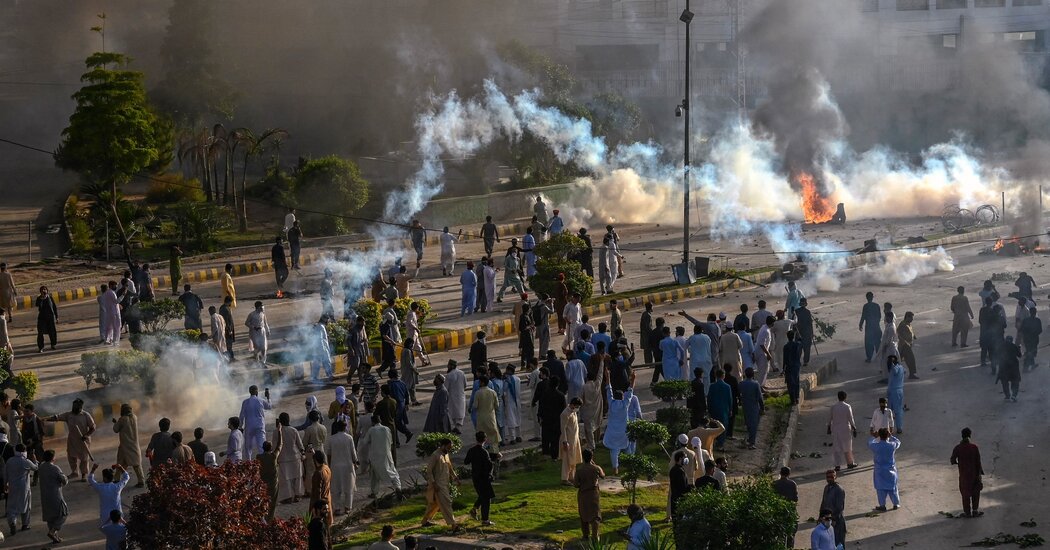Pakistan’s protesters defy the military
A second day of demonstrations in major cities across Pakistan yesterday deepened the turmoil and prompted the army to deploy units in at least two provinces. Many officials fear that extended protests over the arrest of Imran Khan, the former prime minister, could bring the country to a standstill.
Civilians seemed to cross a line in defying the army in Pakistan, where protesters rarely rise up against the military.
Protesters pushed through the gates of the national army headquarters, a mob set fire to a senior military official’s residence and demonstrators looted a paramilitary school.
At least five people have been killed during the two days of protest, local news media reported, and more than 1,000 have been arrested in Punjab Province alone, but the crackdown has had little effect.
Khan: A day after his arrest, he appeared in a police headquarters-turned-courtroom in Islamabad. He denied the corruption charges against him and expressed concerns for his safety while in custody, local news media reported.
Background: The military was accused of paving the route to power for Khan, when he became prime minister in 2018. But when he was ousted in April 2022, it was with the perception of a military green light to remove him, after he had begun antagonizing the generals.
Quotable: “This has become a perfect political storm with very unpredictable consequences,” a former Pakistani ambassador to the U.S. and Britain said. “In the past the army acted as an arbiter of political disputes. Today, the country has no institution that can play that role.”
Ukraine says it reclaimed territory in Bakhmut
Ukrainian military commanders said that their troops had broken through Russian positions on the southern flank of the city of Bakhmut, forcing Russian units back from their positions at an important bridgehead of a canal.
If confirmed, it would be the first significant gain for Ukraine in the fight for Bakhmut since pushing Russian forces off a key access road two months ago. But it is still far from clear whether Ukrainian forces can hold the ground.
Yevgeny Prigozhin, the leader of the Wagner paramilitary group, confirmed that the Russian flank had been broken but promised to stay and fight for a “few more days.”
High stakes: The 11-month battle for Bakhmut, in the eastern Donbas region, has taken on a symbolic significance for both sides that goes far beyond the city’s strategic value. Ukraine and Russia have invested resources and sacrificed soldiers to wear the other down.
Other developments:
India state election may hold hints of the future
The state of Karnataka, home to 65 million people, is the only one governed by Prime Minister Narendra Modi’s party, Bharatiya Janata, or B.J.P., in the country’s more prosperous south, where his Hindu nationalist politics have found less fertile ground.
The election is being closely watched for what it might say about national elections next year, when Modi will seek to extend his tenure into a second decade. Voters cast ballots yesterday, and the results are expected on Saturday.
During the campaign, the party initially employed its usual playbook of trying to polarize the state’s electorate along religious lines. (About 13 percent of its population is Muslim.) But the B.J.P. then shifted tactics and made the race about trust in Modi, who held 19 rallies throughout Karnataka.
The B.J.P.’s shift was an admission that polarizing tactics were just solidifying the support of a section of voters it would have captured anyway, analysts said.
The stakes: For the opposition Indian National Congress, crushed by Modi at the national level in the last two elections, a win in Karnataka would be a much-needed morale booster. The Congress party’s chances of forming a government in the state, on its own or in a coalition, appeared high, according to opinion polls.
THE LATEST NEWS
Asia Pacific
In Mexico, a roving group of volunteer veterinarians treats horses, donkeys and mules in remote areas where vets are scarce. The group has also changed the way people care for the animals they rely on to fetch water, plow fields or get to school.
“If we can help even one donkey that carries 80 kilos of water for an old woman, all the effort we make is totally worth it,” one veterinarian said.
The mythic power of cats in Japan
To be in Japan is to be surrounded by cats.
They can be seen everywhere, on city streets or in any one of the country’s cat theme parks, cat shrines, cat cafes and even cat islands. Aoshima Island, in particular, is home to only a few human residents, and a lot of cats — possibly hundreds.
But there’s no need to go anywhere special when you can get your cat fix right in Tokyo, our reporter writes. Why “travel to an island full of cats when you were already on an island of cats?”
To truly attempt to understand the source of Japan’s reverence, wary affection and sometimes fear of cats requires a journey through history, mythology and religion. Are cats companions, adored captives or demons to be appeased?
PLAY, WATCH, EAT
What to Cook
That’s it for today’s briefing. See you tomorrow. — Justin and Amelia
P.S. The Times added 190,000 digital subscribers last quarter, bringing the total digital subscriber base to 9.7 million. If you’re a subscriber, thank you for supporting our work.
“The Daily” is about E. Jean Carroll’s sexual assault lawsuit against Donald Trump.
We welcome your suggestions about this newsletter. You can reach us at briefing@nytimes.com.

